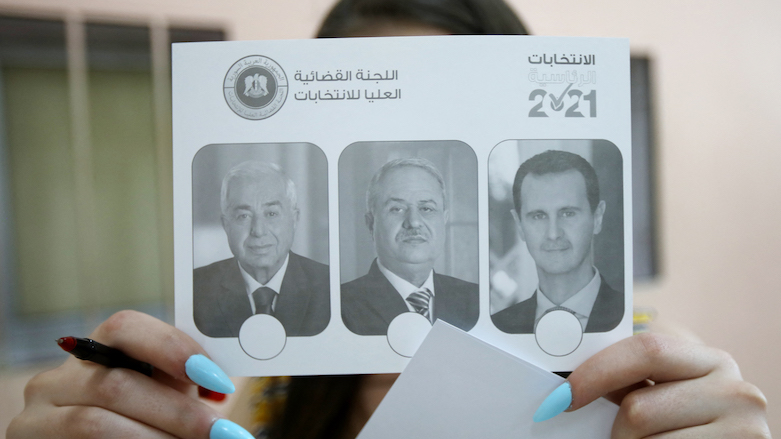US, UK, France, Germany, Italy condemn Syria’s presidential election

WASHINGTON, DC (Kurdistan 24) – The foreign ministers of the US and four major European powers issued a statement on Monday, the day before Syria’s presidential election, strongly criticizing the vote.
“We, the Foreign Ministers of France, Germany, Italy, the United Kingdom and the United States of America wish to make clear that Syria’s May 26 presidential election will neither be free nor fair,” the joint statement of the five senior diplomats began.
In December 2015, the United Nations Security Council established a roadmap for Syria’s future, embodied in Resolution 2254. It called for a political transition to be negotiated between the Syrian regime and the Syrian opposition that would write a new constitution and then hold “free and fair elections.”
In the six years since UNSCR 2254 was approved, none of that has happened. Rather, Russian’s military intervention in support of the Baathist regime of Bashar al-Assad changed the course of the conflict and saved it from overthrow.
As outlined in UNSCR 2254, the statement of the five foreign ministers affirmed, “free and fair elections should be convened under UN supervision” and “all Syrians should be allowed to participate, including internally displaced Syrians, refugees, and members of the diaspora.”
Absent the involvement of those segments of Syrian society, “this fraudulent election does not represent any progress towards a political settlement,” they said, as they urged the international community “to unequivocally reject this attempt by the Assad regime to regain legitimacy without ending its grave human rights violations and meaningfully participating” in the UN-sponsored political process.
Formally, three candidates are running for president in Tuesday’s election, but Assad will assuredly win—and by a large majority—as he has won the previous three elections since 2000, when he came to power after the death of his father Hafez al-Assad, who ruled Syria for 30 years.
The Syrian opposition has denounced the elections as a sham. They “will be used by both the regime and Russia to show that they won, and they claim Syria is safe, so refugees can return,” Suhail al-Ghazi, a non-resident fellow at the Tahrir Institute for Middle East Policy, told the British paper, The Guardian.
The Arab Spring, Syria’s Civil War, and Qasim Soleimani
The “Arab Spring,” which began in Tunisia in December 2010, reached Syria in March 2011. Although dictators fled and governments fell in countries like Egypt, Tunisia, and Yemen, that did not happen in Syria.
From the start, the Syrian regime was backed by Tehran, and Qasim Soleimani, head of the Qods Forces of Iran’s Islamic Revolutionary Guard Corps (IRGC), was Iran’s “main man” in Syria, coordinating support from his own country, as well as various militias, as The Washington Post reported last January following Soleimani’s assassination.
Soleimani “helped orchestrate” the Syrian regime’s “vicious response to rebel attacks inside Damascus and to the threats of a palace coup,” according to Sam Dagher in his book ‘Assad or We Burn the Country,’” the Post said.
In 2012, under the Obama administration, the US Treasury Department imposed sanctions on Soleimani for his participation in “the violent repression against the Syrian people.”
In 2015, Soleimani helped to coordinate the backing from Moscow that would turn the tide in the Syrian civil war. Soleimani assembled the fighters, which included Syrian and Iranian forces, as well as Lebanese Hezbollah and Shi’a militias from Iraq, Afghanistan and Pakistan. They provided the ground troops and would be supported by Russian air strikes.
The Western countries that supported the Arab Spring, including the US, expected a much better outcome across the region than what materialized. In 1989, a series of popular protests brought down Communist regimes throughout Eastern Europe and, in 1991, culminated in the collapse of the Soviet Union itself.
With few exceptions, like Yugoslavia, which saw a bloody conflict among some of its constituent elements, the results were very positive: the end of dictators and the emergence of democratic governments.
But that was not the case with the Arab Spring, which has seen few successes and many failures. In some countries, like Libya, Yemen, and Syria the result has been an extended civil war, with profound consequences, including refugee crises that have spilled over into Europe and which have contributed significantly to the rise of right-wing, populist movements there.
It also contributed to a renewed terrorist surge. After all, ISIS, which the US now considers the most dangerous terrorist group, was founded in Syria, amid the civil war, before it surged across the border into Iraq in the summer of 2014.
Indeed, a little over a year later, in September 2015, Russian President Vladimir Putin addressed the opening of the UN General Assembly for the first time in a decade. He denounced the Western export of democracy, in the process making a profound statement about the uniqueness of cultures and societies.
“We also remember certain episodes from the history of the Soviet Union,” Putin said. “Social experiments for export, attempts to push for changes within other countries based on ideological preferences, often led to tragic consequences and to degradation rather than progress.”
“Far from learning from others' mistakes,” he continued, “everyone just keeps repeating them, and so the export of revolutions, this time of so-called democratic ones, continues.”
“Certainly political and social problems” in the Middle East and North Africa, “have been piling up for a long time, and people there wish for changes naturally,” Putin continued.
“But how did it actually turn out?,” he asked. “Instead of the triumph of democracy and progress, we got violence, poverty and social disaster.”
“I cannot help asking those who have caused the situation, do you realize now what you've done?”
Two days later, the Russian bombing campaign in Syria began.